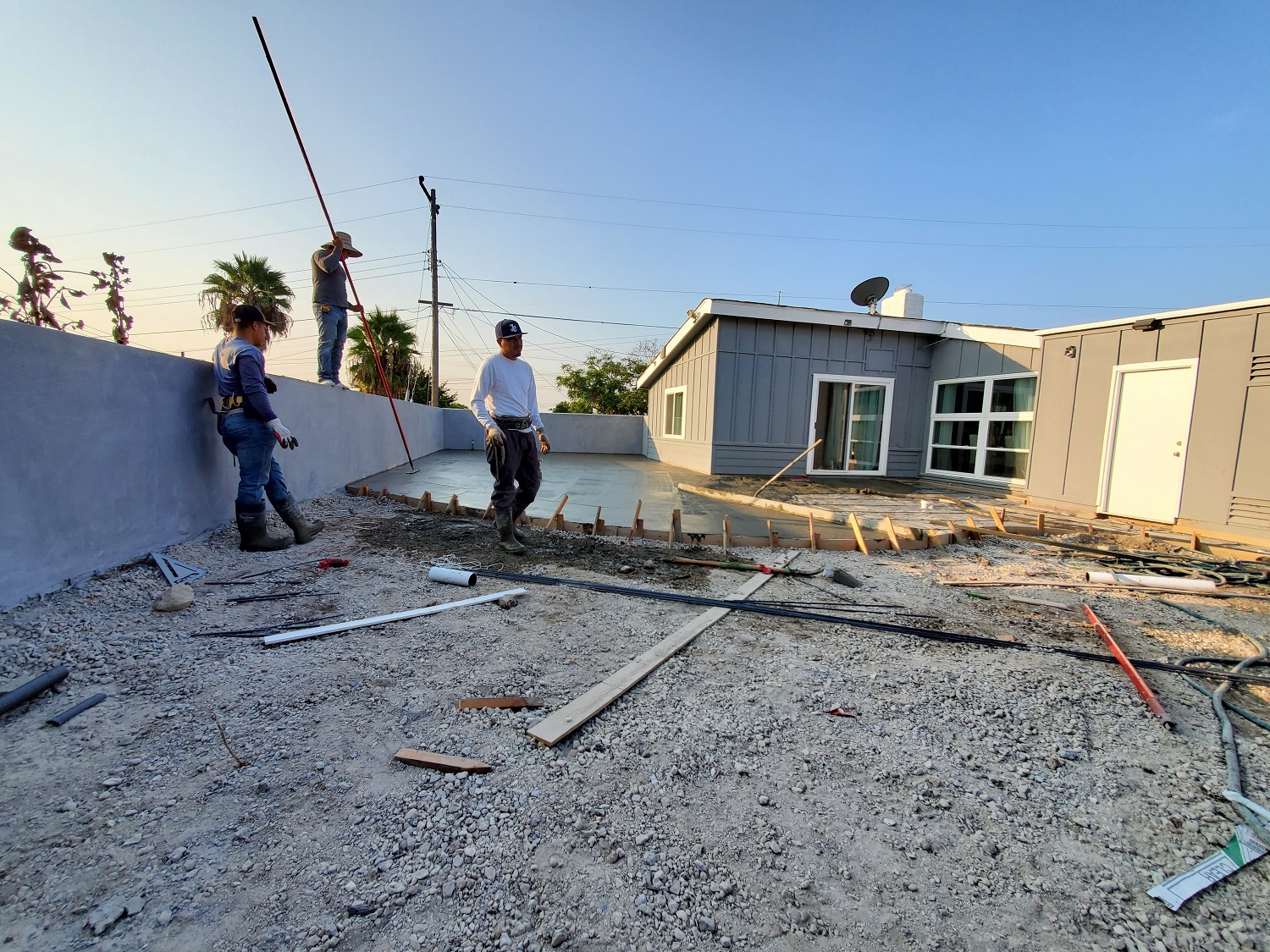
Driveway concrete is a popular choice for homeowners looking to enhance the curb appeal of their property. With its durability and low maintenance, it’s no wonder why many people opt for this material. However, one common question is how thick driveway concrete should be.
The thickness of driveway concrete can vary depending on several factors. The most crucial factor is the weight of the vehicles that will be using the driveway. For example, a driveway that cars will only use can be thinner than a driveway used by heavy trucks or RVs. Additionally, the climate and soil conditions in the area can also impact the thickness required for the concrete.
Understanding Concrete Thickness
Concrete thickness is an essential factor to consider when constructing a driveway. The thickness of the concrete determines the strength and durability of the driveway. Typically, the thickness of the concrete used for driveways ranges from 4-6 inches. However, the thickness may vary depending on several factors, such as the weight of vehicles that will use the driveway, soil stability, and weather conditions.
When constructing a driveway, it is crucial to ensure that the concrete is thick enough to withstand the weight of the vehicles that will use it. Generally, the heavier the car, the wider the concrete should be. For instance, the concrete used for a driveway used by heavy trucks should be broader than that used for a driveway that will only be used by passenger cars.
The thickness of the concrete also depends on the soil stability. If the soil is unstable or has poor drainage, the concrete should be thicker to prevent cracking and sinking. Additionally, weather conditions can also affect the thickness of the concrete. The concrete should be wider to prevent cracking in areas with extreme weather conditions, such as frequent freeze-thaw cycles.
Driveway Concrete Thickness Factors

When it comes to installing a new driveway, the thickness of the concrete is an essential factor to consider. The concrete’s thickness will depend on various factors, including load-bearing capacity, soil type, and climate conditions.
Load Bearing Capacity
One of the most important factors to consider when determining the thickness of driveway concrete is the load-bearing capacity. The load-bearing power refers to the weight the concrete can support without cracking or breaking.
For example, a driveway only used by passenger vehicles will require a different thickness of concrete than that used by heavy trucks or construction equipment. In general, the thicker the concrete, the higher the load-bearing capacity.
Soil Type
Another factor that can influence the thickness of driveway concrete is the type of soil that the driveway will be built on. The soil type can impact the stability of the concrete and its ability to support weight.
For example, suppose the soil is unstable or has a high water table. In that case, the concrete may need to be thicker to prevent cracking or sinking. On the other hand, if the soil is stable and well-draining, the concrete may be less comprehensive.
Climate Conditions
The climate conditions in the area where the driveway will be built can also impact the thickness of the concrete. In places with extreme temperatures or frequent freeze-thaw cycles, the concrete may need to be thicker to prevent cracking.
Additionally, the area is prone to heavy rainfall or flooding. In that case, the concrete may need to be thicker to prevent erosion or damage from water.
Overall, the thickness of driveway concrete will depend on various factors. By considering load-bearing capacity, soil type, and climate conditions, homeowners can ensure that their driveway is built to last.
Standard Driveway Concrete Thickness
The thickness of driveway concrete is essential to consider when constructing a driveway. The standard thickness of driveway concrete is typically between 4 and 6 inches. However, the thickness can vary depending on the weight of the vehicles that will be using the driveway.
For example, suppose the driveway is used by heavy trucks or large RVs. In that case, a thicker concrete slab may be necessary to prevent cracking or damage to the driveway. A thickness of 6 inches or more may be recommended in this case.
It is important to note that the thickness of driveway concrete can also depend on the climate and soil conditions in the area. A thicker concrete slab may be necessary to prevent cracking and shifting in regions with harsh winters or expansive soils.
Overall, the standard thickness of driveway concrete is typically between 4 and 6 inches. Still, it is important to consider the weight of vehicles and the local climate and soil conditions when determining the appropriate thickness for a specific driveway.
Importance of Correct Thickness

Concrete driveways are an essential part of any property, and the thickness of the concrete is a crucial factor in determining its durability, cost efficiency, and safety.
Durability
The durability of a concrete driveway is directly related to the thickness of the concrete. If the concrete is too thin, it cracks and deteriorates quickly, leading to costly repairs. On the other hand, if the concrete is too thick, it will be inexpensive and may not provide any additional benefits.
The recommended thickness for a concrete driveway is between 4 and 6 inches. This thickness provides the necessary strength and durability to withstand heavy traffic and weather conditions.
Cost Efficiency
Correct thickness is also essential for cost efficiency. If the concrete is too thin, it will require frequent repairs and replacements, leading to higher costs in the long run. On the other hand, if the concrete is thick enough, it will be inexpensive, and the extra expense may not provide any additional benefits.
Property owners can use the recommended thickness of 4 to 6 inches to ensure they are getting the best value for their money.
Safety
The thickness of a concrete driveway also plays a significant role in ensuring safety. A thin driveway can crack and create tripping hazards. In contrast, a thick driveway can create steep inclines that are difficult to navigate.
The recommended thickness of 4 to 6 inches provides a safe and level surface that is easy to navigate for both vehicles and pedestrians.
In conclusion, the correct thickness of a concrete driveway is essential for durability, cost efficiency, and safety. By using the recommended thickness of 4 to 6 inches; property owners can ensure that their driveway will last for years to come, provide the best value for their money, and be safe for all users.
Common Mistakes in Determining Thickness

Determining the thickness of driveway concrete is crucial in ensuring its durability and longevity. However, people make some common mistakes when trying to determine the thickness of their driveway concrete. Here are a few of them:
1. Not Measuring the Entire Driveway
One common mistake is measuring only part of the driveway. Some people only measure a small portion of the driveway, assuming the thickness is consistent throughout. However, this is only sometimes the case. It’s essential to measure the entire driveway to get an accurate reading of the thickness.
2. Not Accounting for Variations in Thickness
Another mistake is not accounting for variations in thickness. Driveway concrete can be thicker in some areas than others, especially if the driveway is sloped. It’s important to take these variations into account when measuring the thickness.
3. Relying on Visual Inspection
More than a visual inspection is needed to determine the thickness of driveway concrete. The thickness of the concrete can vary depending on the type of mix used and how it was poured. It’s essential to use tools such as a tape measure or a thickness gauge to get an accurate reading.
4. Assuming Standard Thickness
Finally, assuming a standard thickness can be a mistake. Driveway concrete can vary in thickness depending on the intended use and the vehicle’s weight. It’s essential to consult with a professional to determine the appropriate thickness for your specific driveway.
By avoiding these common mistakes, homeowners can accurately determine the thickness of their driveway concrete and ensure its durability and longevity.
Professional Assessment and Installation

When it comes to driveway concrete thickness, it is essential to have a professional assessment before installation. This assessment will determine the appropriate thickness required for the specific driveway based on factors such as vehicle weight, climate, and soil conditions.
Professional installers know the various thicknesses required for different types of driveways. For example, a residential driveway typically requires a minimum thickness of 4 inches. In comparison, a commercial driveway may need 6 inches or more, depending on the expected traffic load.
The concrete must be poured and leveled evenly during installation to ensure a smooth and durable surface. Reinforcement such as steel bars or wire mesh is also recommended to increase the strength and durability of the driveway.
It is important to note that the thickness of the concrete is not the only factor determining the driveway’s strength. Proper curing and maintenance are also crucial for the longevity and performance of the driveway.
In summary, a professional assessment before installation and proper installation techniques are essential for determining the appropriate thickness of driveway concrete to ensure a durable and long-lasting surface.
Conclusion
As we wrap up our in-depth exploration in “How Thick is Driveway Concrete: A Comprehensive Guide,” it’s clear that understanding the intricacies of driveway concrete thickness is crucial for durability, aesthetics, and long-term performance. Whether you’re a homeowner planning a new driveway or a professional seeking to refine your knowledge, this guide has hopefully illuminated the key factors determining the ideal thickness for different applications and environments.
At Rhino Concrete Bay Area, we’re committed to sharing knowledge and are here to implement that knowledge. Our team of experts is well-versed in all aspects of concrete driveway installation and maintenance. We understand that every project is unique and are dedicated to providing customized solutions that meet your specific needs. From selecting the suitable materials to ensuring the proper thickness and reinforcement, we focus on quality and customer satisfaction.
Remember, the right thickness of your driveway concrete is more than just a measurement – it’s a foundation for the longevity and functionality of your investment. If you’re ready to embark on your driveway project or have any questions about concrete thickness and driveway construction, don’t hesitate to reach out to us at Rhino Concrete Bay Area. We’re here to help you build a driveway that looks great and stands the test of time. Let’s turn your vision into a concrete reality!







